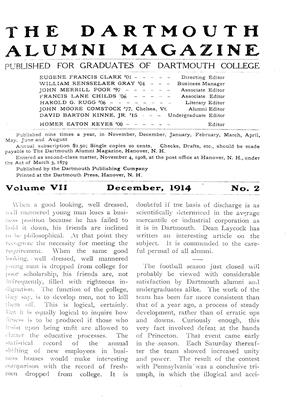A man who writes another book on rhetoric is to be congratulated on his audacity. He should be doubly congratulated if he succeeds in saying some of the old and obvious truths in a new way. In his Principles of Composition and Rhetoric, Dr. Robert Huntington Fletcher has achieved the distinction of deviating at times from the too worn path. As Professor of English in Grinnell College, Dr. Fletcher has had an opportunity to build up a text book as the result of experience with the young college student, and such a raison d'être—which is the only valid one—has contributed no small part of its worth to the volume in question. Beyond the suggestions coming from practical classroom work, Dr. Fletcher's principal inspiration—according to the preface—appears to have been the teaching of Professor C. F. Richardson, to whom he expresses a profound indebtedness. It is, in fact, evident that much of Professor Richardson's enthusiasm and appreciation speak through the portion of the book devoted to the discussion of literature.
The most noteworthy feature of the Principles of Composition and Literature is the scheme upon which the work is constructed. The first part contains eight chapters dealing with the ordinary subjects of rhetoric: elementary statements, words, the most important qualities of style, sentences and paragraphs, exposition, argumentation, description, and narrative. The second part concerns itself with the study of literature and an application thereto of the principles laid down in the first part. The chapters embrace discussions of the general nature of literature ana the proper approach to it, the subject matter of literature, the qualities involved in literary production, style, principles of structure, narration, the drama, and poetry—its spirit and its mechanics. 1 his combination is in many respects a happy one. The greatest barrier to a successful teaching of the art of composition is the divorce of the student's practice from the appreciative, and at the same time analytic, study of the masters from whom alone he is able to learn. The difficulty in the path is, of course, the time required to treat so large a subject carefully; yet, were jit but possible, there is no questhat such a combination of application and analysis, the handling of the student's own work and the masterpieces of our literature from the same point of view, employing the same terminology in both, would go far toward securing the most satisfactory results. The approach to the student's problems and to literature itself through the same avenues is a most happy arrangement.
In the part devoted to rhetoric, considerable space is given to a full discussion of argumentation, with a short but clear excursion into the fundamentals of logic. More valuable, however, is the chapter on description, where, after a careful delimitation of the field, some distinctly valuable suggestions are made, particularly in regard to the securing of pictorial effect and emotional appeal. The whole discussion of literature, in part two, should prove illuminating to the student, and provocative of further study. The vigor and keenness of Professor Fletcher's own appreciation manifest themselves throughout.
From a mechanical point of view the book is excellent. Not the least pleasing of its features is the arrangement whereby the various chapters may be had in separate groups—two groups for the rhetoric and five for the literature—thus making possible a use of any part desired, the employment of different portions in different courses, and die procuring of the books in somewhat more handy form than the rather bulky single volume. Professor Fletcher is to be congratulated both on the scheme which underlies the book and on the mechanical arrangement which makes a successful handling possible.
Robert Huntington Fletcher, Ph.D.,1896 (The A. S. Barnes Co., New York)
 View Full Issue
View Full Issue
More From This Issue
-
 Article
ArticleWhen a good looking, well dressed, well mannered young man
December 1914 -
 Class Notes
Class NotesLOCAL ASSOCIATIONS
December 1914 -
 Article
ArticleMEETING OF THE ALUMNI COUNCIL
December 1914 -
 Article
ArticleA NOTABLE GIFT TO THE LIBRARY
December 1914 -
 Article
ArticleFOOTBALL
December 1914 -
 Article
ArticleTHE BASIS OF DISCIPLINE AT DARTMOUTH
December 1914 By Dean Craven Laycock '96
DAVID LAMBUTH
-
 Article
ArticleANOTHER REPORT TO THE ALUMNI
May 1921 By DAVID LAMBUTH -
 Books
BooksALUMNI PUBLICATIONS
March, 1924 By David Lambuth -
 Books
BooksFACULTY PUBLICATIONS
March, 1924 By David Lambuth -
 Books
BooksFOOL'S ERRAND
FEBRUARY 1929 By David Lambuth -
 Books
BooksTHE DARTMOUTH MURDERS
January, 1930 By David Lambuth -
 Books
BooksMAURICE HEWLETT: HISTORICAL ROMANCER
January 1939 By David Lambuth








